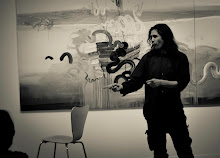One of the strange oddities about philosophy is its love affair with the difficult. And difficulty itself is such a tricky notion. There are three different senses in which philosophy is 'difficult', and only one of which is genuine.
First and most simply, philosophy likes to think of itself, and is thought as, 'difficult'. The motivation of course here is simple. If it is difficult then philosophers are clever - what is more, if it is difficult then the rest of the world need not bother with it at all. Philosophy becomes then a self-invented 'gold-standard' for knowledge. The course we put people on to prove we are serious in study. It becomes then, as it is sometimes taught (and often thought of ) as totally useless and self indulgent idiocy, whose main refrain is 'look at me, I am so very clever I am...I understand...': A feeling that might well be pretension, or might be honest, but either way misses the point. For me, the entire premise of stand up philosophy is that great ideas, even ones which are complicated in their language and subtle in the exposition, still have a power to move, to change the mind, to make one want to think differently. Philosophy however 'hard' has the power to intrigue, and opens on a poetry of possibly, which allows one to re-think one's own nature. Of course this move might in itself be 'difficult', in that it might involve much thought, and much self correction, however it should not feel it, in the same way that rhyming poetry should never feel artificial and forced. Philosophy should fascinate, delight, perhaps perplex, but always entice, and never feel difficult or impenetrable or even just mad.
The second a sense that philosophy is difficult lies in the fact that it does involve in itself a lot of study, and thought. And yet If the thinker is doing their job properly, the difficulty is more a problem of being time-consuming, rather than being 'hard'. Good philosophy takes time. That is of course rather difficult, it gets on the way of 'real life': But that requirement for scholarship in itself, does not make it 'difficult'. It merely says that the world cannot be immediately reacted to or understood - nor should it. Philosophy as stand up takes a certain position in this aspect of the difficult. Its job is to summarise years of study, to condense them into a performance, so that it should at once be highly textured, opening out on many layers, and shifting interpretations (with perhaps many voices), and yet not to ever drown in this knowledge. One must make the difficult feel natural, normal, even exciting. For as Socrates would say, what could be more exciting that being able to think, genuinely think for oneself? And good stand up makes you really want to think (and not merely argue or strop or simply react).
The final common use for the word difficult in this context is much harder to counter. Something is difficult if it makes the world difficult, edgy, not straight-forward. The difficult turns the world into a problem, and shatters easy had given solutions to that problem. A move, a making difficult, that philosophy, including as stand up, always claims as somehow peculiarly its own. The game is always to make that difficulty not feel hopeless or pointless. It might make the world more tricky, but the difficulty is worth it, or is at least worth trying. A move that is always difficult to make for every individual, but which which stand up philosophy hopes to inspire.
In short stand up is difficult because it makes one want to address the difficulty of the world, and should never be merely pointlessly 'hard'.


I think philosophy is difficult in the same way that psycho-analytic thought is difficult. It invites us to pay conscious attention to the questions with lie underneath the the thoughts and ideas that occupy our everyday thinking. This not only requires a lot of effort until you are used to it, because it means acquiring totally new thought patterns, but also the new ideas may be disturbing, disrupting the carefully constructed ideations that have long served to manage many fears and anxieties.
ReplyDeleteStandup philosophy, I suggests, contains those ideas within a human personality, as psychoanalysis takes place within a relationship. So contained, the previously unthinkable can be made safe and so be allowed into consciousness